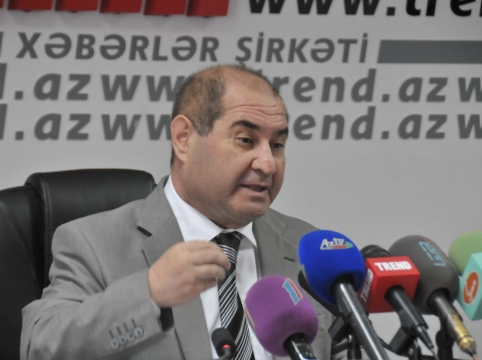EU envoy's Karabakh visit could be linked to EU's new peace initiative - analyst

By Aynur Jafarova
A visit of the European Union Special Representative for South Caucasus Philippe Lefort to Nagorno-Karabakh -- an Azerbaijani region under Armenian occupation -- could be related to the implementation of the EU's new three-year project for a settlement of the Nagorno-Karabakh conflict, an Azerbaijani political expert believes.
"The project also envisages participation of the people who suffered from the Nagorno-Karabakh conflict," head of the Center for Political Innovation and Technologies, Mubariz Ahmadoglu, said on Tuesday. "The meeting of Lefort with Azerbaijani community of Nagorno-Karabakh during his last visit to Baku, using expressions like 'Armenian and Azerbaijani communities of Nagorno-Karabakh' and 'dialogue between the communities' indicate the benefit of the real meaning of this EU project. However, Armenians have repeatedly brought to naught the influence of such beneficial projects."
Ahmadoglu stressed that it is necessary to prepare good mechanisms for the implementation of this project. Therefore, Lefort should perceive the responsibility of his first visit to Nagorno-Karabakh, he added.
According to Ahmadoglu, if Lefort visits Nagorno-Karabakh alone, it will be in favor of the Armenians. Armenians will use this for imitation of the peace negotiations, regard his visit as a step towards the recognition of Nagorno-Karabakh as an independent state and then they will not allow Lefort to go to Nagorno-Karabakh together with Azerbaijanis, Ahmadoglu said.
Lefort should be seriously prepared for the EU project on a settlement of the Nagorno-Karabakh conflict, demonstrating the importance of his visit for the Armenians. Therefore, he has to think over three issues, he said.
First, he must enter Nagorno-Karabakh from Aghdam with the Azerbaijani community of Nagorno-Karabakh. There is high probability that the Armenian government will not allow the realization of this step, Ahmadoglu said.
Second, Lefort invites representatives of both communities of Nagorno-Karabakh to Brussels and organizes a meeting for them, he said. Therefore, through these meetings a mechanism of dialogue is created step-by-step which he will then extrapolate to the Nagorno-Karabakh territory. In this case the steps taken by the EU in the settlement of the Nagorno-Karabakh conflict and efforts for confidence-building will have an effect, Ahmadoglu added.
"Third, Lefort meets with representatives of the Armenian community of Nagorno-Karabakh in Yerevan, informs them about his mission, stressing that he has met with the Azerbaijani community of Nagorno-Karabakh in Baku. The Armenians should not enjoy the benefits of the aggressive war and must realize that they are making a big mistake," Ahmadoglu said.
Earlier, Azerbaijani Deputy Foreign Minister Araz Azimov said that Lefort must explain the purpose of his planned visit to Nagorno-Karabakh.
"Nagorno-Karabakh is under occupation and one can visit these areas only after obtaining Azerbaijan's permission," Azimov noted.
He said that for now the EU is not involved in the conflict settlement, but only supports the efforts of the Organization for Security and Cooperation in Europe (OSCE) Minsk Group. In the future, however, the EU may be involved in resolving any issues related to the conflict, the deputy minister said.
The conflict between Azerbaijan and Armenia began in 1988 when Armenia made territorial claims against the neighboring country. Armenian armed forces have occupied 20 per cent of Azerbaijan's territory since a war in the early 1990s, including Nagorno-Karabakh and seven surrounding regions.
Azerbaijan and Armenia signed a ceasefire agreement in 1994. The co-chairs of the OSCE Minsk Group - Russia, France and the U.S. - are holding peace negotiations. Peace talks have been largely fruitless so far.
Armenia has not yet implemented the U.N. Security Council's four resolutions on liberation of the occupied Azerbaijani territories.
Here we are to serve you with news right now. It does not cost much, but worth your attention.
Choose to support open, independent, quality journalism and subscribe on a monthly basis.
By subscribing to our online newspaper, you can have full digital access to all news, analysis, and much more.
You can also follow AzerNEWS on Twitter @AzerNewsAz or Facebook @AzerNewsNewspaper
Thank you!
